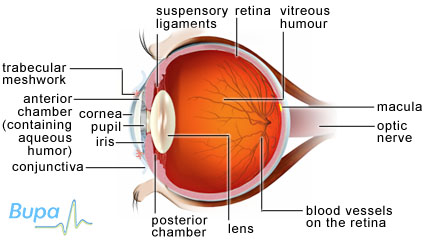Glaucoma
This factsheet is for people who have glaucoma, or who would like information about it.
Glaucoma is the name for a group of eye conditions where your optic nerve is damaged and vision deteriorates.
About glaucoma
Types of glaucoma
Symptoms of glaucoma
Causes of glaucoma
Diagnosis of glaucoma
Treatment of glaucoma
Prevention of glaucoma
About glaucoma
If you have glaucoma, your optic nerve (the nerve that connects your eye to your brain) is damaged at the point where it leaves your eye. Sometimes this can be the result of an increase in pressure in your eye, which usually happens when fluid (the aqueous humour) in the front part of your eye (the anterior chamber) doesn't drain away properly. Usually the amount of fluid produced in your eye is balanced by the amount draining away, so the pressure in the front part of your eye remains controlled. If you have glaucoma, the pressure within your eye can be so high that your optic nerve is damaged and you may begin to lose your sight.
Glaucoma can also result from a weakness in your optic nerve, which can lead to damage even when the pressure in your eye appears to be normal. In most people, glaucoma is caused by both high pressure and a weakness in the optic nerve to varying extents.
Glaucoma can affect both of your eyes, but one eye may be affected more than the other. If you get treatment early, it can prevent further sight loss.

Types of glaucoma
Chronic open angle glaucoma
Chronic open angle glaucoma (also called primary open angle glaucoma) is the most common type. It develops very slowly and damage to your nerve and eyesight happens gradually.
You can get chronic glaucoma if the drainage channels (through which fluid in your eye flows) become blocked as this can slowly raise the pressure within your eye.
Normal tension glaucoma
A form of chronic glaucoma called normal tension glaucoma can occur even if the pressure in your eye is within the normal range, which is usually less than 22 millimetre of mercury (mm Hg). It's thought that the optic nerve may have a poor blood supply or a weakness.
Acute angle-closure glaucoma
This type of glaucoma happens when the pressure in your eye rises very quickly. The drainage angle that lies between the cornea (the clear window at the front of your eye) and the iris (the part that gives your eye its colour) narrows suddenly. This prevents fluid in your eye from flowing out of your eye.
Acute glaucoma can be very painful and you must seek urgent medical attention. It can cause permanent blindness unless treated quickly.
Secondary glaucoma
If you have other eye conditions, such as an injury to your eye or repeated inflammation, you can get secondary glaucoma. If you have diabetes, you may be at risk of developing a type of secondary glaucoma called rubeotic glaucoma.
Congenital glaucoma
This is a very rare condition where a baby is born with glaucoma. The tissues at the angle of the anterior chamber don't develop properly and this slows the flow of the fluid out of the eye.
Symptoms of glaucoma
If you have chronic open angle or secondary glaucoma, you probably won't notice any symptoms until your sight has deteriorated considerably. This is because the first part of your sight to be affected is the outer or peripheral field of vision. Your central vision, which you use to focus on objects, isn't usually affected until much later.
Acute glaucoma tends to come on very quickly and symptoms include:
- loss of sight
- pain in your eye
- a headache
- blurred vision or a halo around lights
- feeling sick or vomiting
- redness in the white of your eye
If you think you're having an attack of acute glaucoma, you must seek urgent medical attention.
It can be difficult to recognise symptoms of congenital glaucoma but if your baby has watering eyes, is very sensitive to light or has cloudy, white, enlarged eyes, make an appointment to see a doctor.
Causes of glaucoma
Glaucoma is caused by an increase in pressure within your eye or a weakness in the optic nerve, or both.
You're more likely to get glaucoma later in life. Other factors that can increase your chances of getting glaucoma include:
- ethnicity – if you're of African or black Caribbean origin, you're more at risk of getting chronic open angle glaucoma and it may affect you earlier in life and be more severe, while if you're of Asian descent, you're more likely to get acute angle-closure glaucoma
- a family history of glaucoma
- being very short-sighted
- diabetes
Diagnosis of glaucoma
You may not have any symptoms until you start to lose your sight. Therefore, screening tests are important to detect glaucoma. An optometrist – a registered health professional who examines eyes, tests sight and dispenses glasses and contact lenses – can do these during a routine eye test.
As glaucoma is more common if you're over 40, it's important to have an eye test at least every two years from this age onwards. It's also important to be tested regularly if you're at risk of developing glaucoma, for example if a family member has it or you have diabetes.
An eye test usually takes about 30 minutes and includes a number of tests for glaucoma. Your optometrist may::
- look at your optic nerve by shining a light from a torch instrument into your eye
- look at the thickness of your cornea
- measure the pressure in your eye using a tonometry test – a small amount of pressure is applied to your eye using a tiny tool or a warm puff of air
- measure your field of vision in a perimetry test by showing you a sequence of spots of light on a screen and asking you which ones you can see
If your optometrist thinks you may have glaucoma, he or she may refer you to an ophthalmologist (a doctor who specialises in eye health, including eye surgery) for more tests. These may include a test to examine the area in your eye where the fluid drains out.
Please note that availability and use of specific tests may vary from country to country.
Treatment of glaucoma
Treatment for glaucoma aims to lower the pressure inside your eye to reduce your risk of losing your sight or prevent any further loss of sight. Treatment can't reverse any existing optic nerve damage, so it won't improve your sight if it has already deteriorated.
Medicines
Eye drops to treat glaucoma include:
- prostaglandin analogues that help your eye's internal fluid drain out more quickly
- beta-blockers that reduce the pressure in your eye – they slow down the build-up of fluid by reducing the production of it
- carbonic anhydrase inhibitors that lower pressure in your eye by reducing fluid build-up
- sympathomimetics that reduce pressure in your eye and help the fluid build-up to drain away
Several other types of medicine are available as alternatives or in addition to prostaglandins or beta-blockers. It's important that you follow your ophthalmologist's advice and use the medicines as he or she advises to ensure the treatment is effective. If you don't, the pressure in your eye will rise again.
If you think your medicine is causing a side-effect, speak to your ophthalmologist as soon as possible. He or she can advise you and if necessary, prescribe alternative eye drops or consider other treatments.
Always ask your doctor for advice and read the patient information leaflet that comes with your medicine.
Surgery
A laser can be used to open the holes in the draining system to help fluid drain out of your eye or stop your eye producing as much fluid.
Laser treatment
Laser treatment uses a laser to open the holes in the draining system in your eye to help fluid drain out or to stop your eye producing as much fluid. Laser treatment may also be used to make a small hole in your iris if you are at increased risk of or have acute angle closure glaucoma. This allows fluid in your eye to circulate and may open the angle to reduce the risk of it closing.
Laser treatments are usually quick and cause little discomfort. It can be done under local anaesthesia and you will be able to go home the same day. The success of this type of treatment varies from person to person, and you may need to continue using eye drops after treatment.
Trabeculectomy surgery
You may need surgery if medicines and/or laser treatment haven't lowered the pressure in your eye.
There are a range of operations; the most commonly performed is trabeculectomy. In this operation a tiny opening is created in your eye wall to allow fluid to escape under the thin lining of the white of your eye (the conjunctiva) and be absorbed back into your bloodstream. You may have the operation under local or general anaesthesia – ask your surgeon for advice.
Availability and use of different treatments may vary from country to country. Ask your doctor for advice on your treatment options.
Prevention of glaucoma
If you're over 40, it's important to have an eye test every two years to check for the early signs of glaucoma. If one of your parents, children, brother or sister has glaucoma, have an eye test every year.
This section contains answers to common questions about this topic. Questions have been suggested by health professionals, website feedback and requests via email.
Why should I register as blind or partially sighted?
Does it help to follow a particular diet?
What if I forget to put in my eye drops?
Why should I register as blind or partially sighted?
Answer
If you have glaucoma, registering as blind or partially sighted if you’re eligible to do so can make it easier to get practical help. It may also mean you can get financial benefits.
Explanation
If your glaucoma has reached a stage where your vision has been severely affected, you may be eligible to register with your local council as blind or partially sighted. You don’t have to register but doing so can help you to get any support you need.
It’s important to realise that being registered doesn’t mean you have lost or will lose your sight completely. It just records that your level of vision is such that you may require assistance in certain areas and allows you to access these facilities more readily.
To find out whether you’re eligible for registration, you will need to see an ophthalmologist (a doctor who specialises in eye health, including eye surgery). He or she will assess you by carrying out some eye tests, and if necessary, give you a certificate of vision impairment. With your agreement, this will be sent to your local social services or social work department. Eye clinics in many hospitals offer the opportunity to discuss things further with a liaison officer who is trained to provide advice and support for people with visual impairment.
Once they have received your certificate of visual impairment, your social services department will contact you to find out what help you may need. They may be able to offer you services such as:
- practical help in your home
- carrying out modifications to your home
- using leisure/education facilities, including arranging transport
- getting meals in your home or elsewhere – for example, at a day centre
The amount of support that is available varies so ask your local council for more information.
Further information
Royal National Institute of Blind People
0303 123 9999
www.rnib.org.uk
Sources
- Understanding glaucoma. The Royal College of Ophthalmologists. www.rcophth.ac.uk, accessed 4 June 2009
- Your rights. Royal National Institute of Blind People. www.rnib.org.uk, accessed 5 June 2009
Does it help to follow a particular diet?
Answer
No, there's no evidence that following a particular diet helps to treat or prevent glaucoma.
Explanation
Many claims have been made about following different diets and taking various supplements to treat glaucoma. However, there is little, if any, scientific evidence to back up these claims.
Aim to eat a balanced diet that's low in saturated fat, sugar and salt and high in fibre, vegetables and fruit.
It’s best not to drink large volumes of fluid in a short period of time, as this can temporarily raise pressure in your eye.
Further information
International Glaucoma Association
01233 648170
www.glaucoma-association.com
Sources
- About glaucoma. International Glaucoma Association. www.glaucoma-association.com, accessed 4 June 2009
- Glaucoma Annual Evidence Update: 24-30 November 2008: Epidemiology. NHS Evidence. www.library.nhs.uk, accessed 5 June 2009
- Glossary: diet. International Glaucoma Association. www.glaucoma-association.com, accessed 5 June 2009
What if I forget to put in my eye drops?
Answer
If you forget a dose, put in your eye drops as soon as you remember.
Explanation
It isn’t a problem if you forget to use your eye drops on the odd occasion. However, it’s important to get into a routine of using your eye drops at around the same time every day to help you remember.
Try using a chart with tick boxes to keep a check on whether you have taken your eye drops every day. You could also set a timer to ring at a particular time to remind you when you need to put them in.
Using your drops regularly, as advised by your doctor, offers the best protection against glaucoma and will prevent it getting worse.
Further information
International Glaucoma Association
01233 648170
www.glaucoma-association.com
Royal National Institute of Blind People
0303 123 9999
www.rnib.org.uk
Sources
- Glaucoma: diagnosis and management of chronic open angle glaucoma and ocular hypertension National Institute for Health and Clinical Excellence (NICE), April 2009. www.nice.org.uk
- About glaucoma. International Glaucoma Association. www.glaucoma-association.com, accessed 4 June 2009
Related topics
Glaucoma
Short-sightedness
This information was published by Bupa's health information team and is based on reputable sources of medical evidence. It has been peer reviewed by Bupa doctors. The content is intended for general information only and does not replace the need for personal advice from a qualified health professional.
Publication date: October 2009.
Related topics
Short-sightedness
Type 1 diabetes
Type 2 diabetes
Further information
International Glaucoma Association
01233 648170
www.glaucoma-association.com
Royal National Institute of Blind People
0303 123 9999
www.rnib.org.uk
Sources
- Sena DF, Ramchand K, Lindsley K. Neuroprotection for treatment of glaucoma in adults. Cochrane Database of Systematic Reviews 2010, Issue 2. doi:10.1002/14651858.CD006539.
- Glaucoma. Royal National Institute of Blind People. www.rnib.org.uk, published 8 June 2011
- Glaucoma: diagnosis and management of chronic open angle glaucoma and ocular hypertension. National Institute for Health and Clinical Excellence (NICE), April 2009. www.nice.org.uk
- Facts about glaucoma. National Eye Institute. www.nei.nih.gov, published September 2009
- Glaucoma and ocular hypertension. Prodigy. www.prodigy.clarity.co.uk, published September 2010
- Primary open-angle glaucoma. eMedicine. www.emedicine.medscape.com, published 20 May 2011
- Five common glaucoma tests. Glaucoma Research Foundation. www.glaucoma.org, published 16 May 2011
- Acute angle-closure glaucoma. eMedicine. www.emedicine.medscape.com, published 10 November 2010
- Neovascular glaucoma. eMedicine. www.emedicine.medscape.com, published 9 March 2011
- Visiting an optician. Royal National Institute of Blind People. www.rnib.org.uk, published 21 October 2010
- Joint Formulary Committee. British National Formulary. 62nd ed. London: British Medical Association and Royal Pharmaceutical Society of Great Britain; 2011
- Gray TA, Orton LC, Henson D, et al. Interventions for improving adherence to ocular hypotensive therapy. Cochrane Database of Systematic Reviews 2009, Issue 2. doi:10.1002/14651858.CD006132.pub2
- Registering your sight loss. Royal National Institute of Blind People. www.rnib.org.uk, published 13 January 2011
- Special diets for ocular hypertension (OHT) and chronic open angle glaucoma (COAG). NHS Evidence. www.library.nhs.uk, published 23 February 2011
- A feast for your eyes. The College of Optometrists. www.college-optometrists.org, published 12 July 2011
- Glaucoma and driving. Direct.Gov. www.direct.gov.uk, accessed 14 July 2011
- What happens after you have told DVLA about your health condition. Driver and Vehicle Licensing Agency. www.direct.gov.uk, accessed 14 July 2011
- For medical practitioners: At a glance guide to the current medical standards of fitness to drive. Driver and Vehicle Licensing Agency, February 2011. www.dft.gov.uk
This information was published by Bupa’s health information team and is based on reputable sources of medical evidence. It has been peer reviewed by Bupa doctors. The content is intended for general information only and does not replace the need for personal advice from a qualified health professional.
















